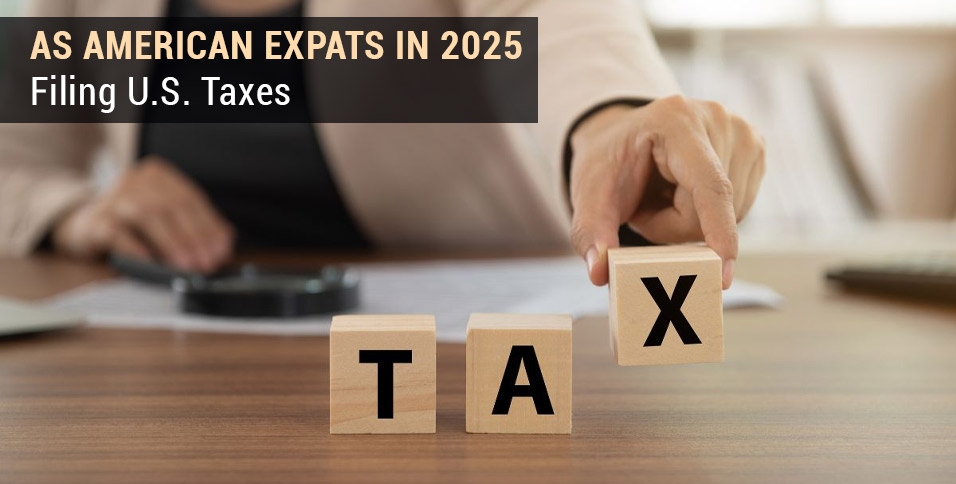Navigating U.S. tax obligations as an American expat in 2025 can feel overwhelming, especially with the added complexity of managing foreign income and assets. However, with careful planning and a clear understanding of requirements, you can avoid common pitfalls and maximize available benefits. This guide provides essential insights to simplify the process of filing taxes in 2025.
Why American Expats Are Required to File Taxes
The U.S. is one of the few countries that employs a citizenship-based taxation system. Regardless of where you live, U.S. citizens and Green Card holders must file an annual tax return to report worldwide income.
Key Considerations
- Worldwide Income Reporting:
All income, whether earned in the U.S. or abroad, must be reported. This includes wages, rental income, and investment earnings. - Filing Thresholds:
Your obligation to file is determined by your gross income and filing status. For example:- Single: $12,950
- Married Filing Jointly: $25,900
- Head of Household: $19,400
- FBAR and FATCA Compliance:
- FBAR (FinCEN Form 114): If your foreign bank accounts exceed a combined value of $10,000 at any time during the year, you must report them.
- FATCA (Form 8938): If specified foreign assets exceed $200,000 (or $300,000 at any time during the year for single filers abroad), reporting is mandatory.
Steps to File U.S. Taxes as an Expat in 2025
1. Determine Your Filing Status
Your filing status (single, married, head of household, etc.) affects your tax bracket, deductions, and credits. Choose the most accurate status to optimize your return.
2. Gather Essential Documentation
- U.S. Income Forms: W-2s and 1099s for income earned from U.S. sources.
- Foreign Income Proof: Salary slips, employer statements, or contractor payments.
- Foreign Bank Details: For FBAR and FATCA compliance.
- Housing and Living Expenses: Proof of housing costs for the Foreign Housing Exclusion.
3. Utilize Expat-Specific Tax Benefits
Several provisions can significantly reduce your U.S. tax liability:
- Foreign Earned Income Exclusion (FEIE):
Excludes up to $126,500 of foreign earned income in 2025. To qualify, you must meet the Physical Presence Test (330 days in a foreign country) or the Bona Fide Residence Test. - Foreign Tax Credit:
Avoids double taxation by crediting taxes paid to foreign governments against your U.S. tax liability. - Foreign Housing Exclusion/Deduction:
Covers housing expenses exceeding the IRS base amount for your location.
4. File the Correct Tax Forms
To meet compliance requirements, you may need the following:
- Form 1040: Standard U.S. tax return.
- Form 2555: For FEIE and housing benefits.
- Form 1116: To claim the Foreign Tax Credit.
- Form 8938 and FinCEN Form 114: For foreign assets and accounts.
5. Meet Deadlines and Extensions
- April 15: Standard U.S. tax deadline.
- June 15: Automatic two-month extension for expats.
- October 15: Additional extension available upon request.
Challenges Faced by Expats
Exchange Rate Calculations
The IRS requires income and expenses to be reported in U.S. dollars. Use the annual average exchange rate for consistent reporting unless specific transaction rates apply.
State Tax Obligations
Some states, like California and New York, may require tax filings even if you no longer reside there. Research your state’s rules to avoid unexpected liabilities.
Avoiding Double Taxation
Strategically use the FEIE or Foreign Tax Credit. While both reduce tax burdens, they cannot be applied simultaneously to the same income.
Recent Legislative Updates Affecting Expats
Efforts are underway to reform the citizenship-based taxation system, with proposals advocating for a residence-based system. While not yet enacted, these changes could alleviate tax burdens for many expats in the future.
Additionally, thresholds for reporting foreign income and assets under FATCA and FBAR remain unchanged for 2025, but the IRS is increasing scrutiny on international compliance.
FAQs
1. Do I need to file if I owe no taxes?
Yes, you must file if your income exceeds the threshold, even if exclusions or credits reduce your liability to zero.
2. How do I avoid penalties for late filing?
File extensions as needed and ensure timely FBAR and FATCA compliance to avoid fines.
3. Can I claim dependents while living abroad?
Yes, as long as dependents meet IRS criteria, such as being U.S. citizens or residents.
Conclusion: Simplify Filing Taxes in 2025
Filing taxes as an expat in 2025 requires careful planning, understanding of obligations, and utilization of expat-specific tax benefits like the FEIE and Foreign Tax Credit. Stay organized, adhere to deadlines, and consider consulting a professional to optimize your tax situation.
For expert assistance with Expat US Tax, our team offers tailored services to help you navigate compliance, reduce liabilities, and ensure peace of mind.















